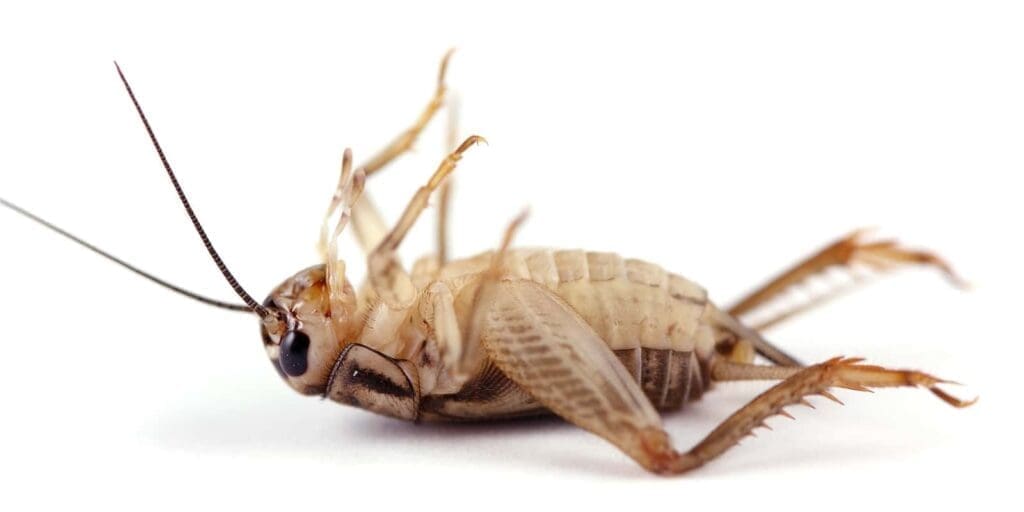
Cricket Infestation: Damaging to Your Home or Garden?
When you think of insects that double as household pests, you envision termites, ants, and even cockroaches. More often than not, crickets don’t come up right away when discussing the most annoying unwanted guests but make no mistake, they can be quite problematic as well.
Though they may be best known for their signature chirping habits, crickets can also be damaging to your home if they are left unaddressed. You don’t want to see the damage they can do, so it’s best to handle a cricket infestation as soon as possible.
To find out more about crickets, their potential as pests, and how to handle them, please read on.
What Are Crickets?
Crickets belong to the Gryllidae family, and according to the University of Minnesota, they are relatives of grasshoppers and katydids.
They mostly like to move around at night, which is why you often hear those familiar chirping sounds during that time of the day as well. Speaking of those chirping sounds, you may be surprised to learn that it can mean different things and vary in terms of pattern.
Per Wikipedia, some chirping songs are designed to attract mates or perhaps encourage females to lay their eggs right away. In certain situations, the chirping you hear could be a prelude to a confrontation between two male crickets.
Crickets are also known to chirp at higher rates when the temperature is warmer.
Their chirping can be annoying, but you can live with it. That's not the thing about crickets you need to worry about.
Why a Cricket Infestation Can Be Damaging to Your Home or Garden
Diets can vary among different cricket species. Some prefer to consume only plants, while others will branch out and eat other insects.
It’s no problem if the crickets are munching down on the insects near your property, but they won’t stick to only eating those. The cricket’s diet puts your garden at risk.
Once crickets see the bounty of insects and plants available in your garden, you can wager on them hanging around for a while and getting their fill. These insects are particularly fond of grass, leaves, seeds, fruits, and flowers, so it will be hard to get them to stay away from your gorgeous garden.
It doesn’t hurt that there are insects in your garden too, so the crickets that have paid a visit can switch things up if they so desire.
After working so hard to cultivate your garden, you want nothing to do with crickets rampaging all over it and biting down on any plants they like.
So, what if you don’t have a garden and you aren’t too worried about some blades of grass in your yard? Does that mean that you should no longer be concerned about crickets?
Well, not exactly.
Crickets indeed prefer to stick to plants and insects when eating, but they eat fabrics as well. As noted by this article from Texas A&M, some crickets will feed on fabric that has perspiration stains.
Beyond that, crickets can also damage your home décor because they tend to leave behind feces and vomit on wall coverings, drapes, and even clothes.
You can certainly make a case that crickets are not as threatening as insects such as termites because they will not deal any structural damage to your home. However, your decorative items and the overall appearance of your home will suffer if you experience a cricket infestation.
The Signs of a Cricket Infestation
You should not take a cricket infestation lightly, but how can you tell if your household is already in the middle of one?
The first thing you should do is to try and listen. Crickets may still chirp even when they’re inside your home. If you’ve noticed that the chirping sounds are louder than usual, you can take that as a sign that some crickets have made their way inside your home.
You should also check your curtains and clothes as they can point to a cricket infestation. Crickets can leave behind small bite marks on fabrics, so take a close look if you suspect their presence.
Another indicator of a potential cricket infestation is their odor. These insects produce a distinct odor when they die. It's hard to describe, but you can detect it because it's so unusual.
One more sign that your home is under siege from crickets is the sight of actual dead crickets. The remains of dead crickets tend to pile up in a hurry, and you may notice them under outdoor light fixtures.
Don’t assume that the dead crickets you’ve seen account for all the insects that have invaded your home. There could be more inside, and you need to do something about them.
How to Address a Cricket Infestation
Let’s say that you’ve already noticed the signs of a cricket infestation. What should you do about it now?
First off, you should know that crickets go towards the light, and they could perceive your home as a welcoming environment if it shines brightly at night.
You can respond to that by either changing your lights or turning them off. Specially designed bug lights are not enticing to crickets, and you can use them if you want to keep your potential home invaders at bay while keeping some form of illumination.
Crickets may also approach your home if they are seeking shelter. These insects will hide in bundles of wood, leaves, and boxes that you leave near your home. Dispose of those items properly to discourage crickets from approaching.
It’s also a good idea to repair any cracks that may have appeared along the walls of your home as the crickets may use them to gain entry.
If you’ve tried the tips mentioned above and you’re still having difficulty reducing the number of crickets, you should look into professional pest control. Exterminators can effectively get rid of the crickets in and around your home while also preventing future infestations.
Though you may not immediately identify crickets as pests, it’s important to understand the damage they can do to your property. Prevent them from wreaking havoc inside your home by seeking the help of the professionals right away.
We hope you enjoy these informational articles. If you'd like to learn more about our eco-friendly pest control services, call (844) 955-2447.
Read More
Your Path to a Pest-Free Home or Business
Romex Pest Control
We are committed to protecting you, your children, and your pets with our eco-friendly, child-friendly, and pet-friendly guaranteed pest control solutions.
Romex Pest Control is fully insured and licensed in Texas, Oklahoma, Louisiana, and Mississippi.
Service Areas:
Hours
M-F 8 am–5 pm
Sat 8 am–2 pm
Sun Closed
Established 2016 © Copyright 2025 Romex Pest Control










